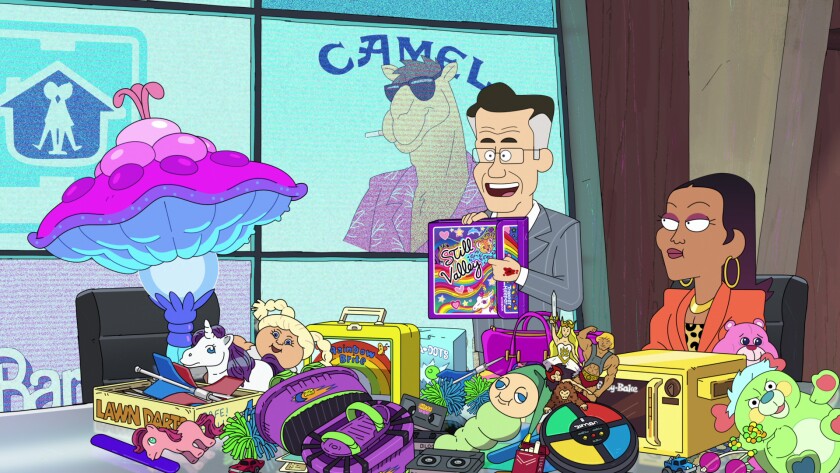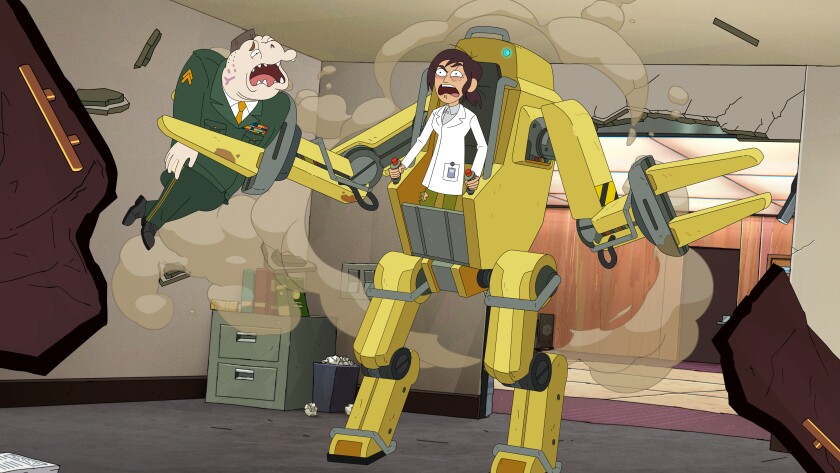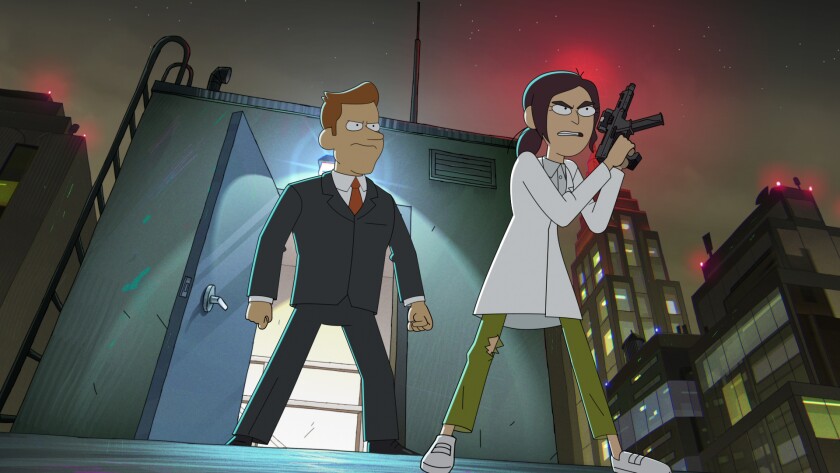In “Inside Job” conspiracy theories are just the backdrop
In “Inside Job,” certain celebrities and politicians are revealed to be members of a race of shape-shifting lizard people that secretly live alongside humans. These reptoids help fund the work of the shadow government, which in turn ensures that the Earth stays at their preferred climate.
That’s just one of the routine conspiracies being handled by Cognito Inc., a “company” enacting the will of a shadowy cabal of ancient elites who control the world. Created by first-time showrunner Shion Takeuchi, Netflix’s latest adult animated series shows that even those coordinating coverups and surveilling the masses can’t escape workplace mishaps and drama.
At the center of the show is Reagan Ridley (voiced by Lizzy Caplan), a brilliant but dysfunctional scientist who is ill-equipped to handle standard social niceties. As the series begins, Reagan is anticipating a promotion that would put her in charge at Cognito Inc. — though things don’t turn out exactly as she hopes.
“The show is about Reagan’s personal journey,” Takeuchi said during a recent phone call. “The idea of someone who is extremely logical and pragmatic and working in a really cynical company that is the deep state, and still wanting to make the world a better place is an interesting irony.
“She is a character that doesn’t sound, talk, look or act very much like a leader,” she added. “I wanted to see, how does one become a leader in those instances?”
Despite the ways that once-fringe theories have increasingly spread into the mainstream in recent years, “Inside Job’s” timely arrival is more of a coincidence. The long production timeline involved in animation meant Takeuchi was developing the core concepts of the show before debunking conspiracies became a routine necessity of the news cycle.
“I didn’t love it,” Takeuchi said of watching conspiracy theories becoming more prevalent. “It’s been a wild ride watching all this stuff unfold. I’m having the same experience as anyone else. But I guess it’s confirmation that we’ve all been feeling kind of similar things in the zeitgeist.”

Magic Myc (a mushroom creature), left, JR and Gigi in “Inside Job.”
(Netflix)
“To be clear, I don’t actually think there is a shadow government,” said Takeuchi, whose previous credits include writing on the series “Gravity Falls” and “Disenchantment.” “I just want people to know where I stand on that one.”
Takeuchi first encountered the concept of a “shadow government” as a college student when she discovered the online archives of the late-night paranormal radio show “Coast to Coast AM.” Initially, she found the idea of “a secret group of people in the true seat of power playing fourth-dimensional chess with the world” terrifying.
“If you believe that you have no agency in the world, how can you believe in anything [or have] any kind of social trust?” said Takeuchi.
But she realized that successfully running a shadow government likely required a level of competence she didn’t think was plausible, given what she had experienced as part of the workforce. Still, when Takeuchi noticed that listening to these theories on the radio show was affecting her perspective, she knew it was time for a break.
“I didn’t really think about it [again] until five years ago when we were going through the beginnings of a lot of social turmoil,” Takeuchi said. “It seemed like every day there was something chaotic and disastrous and new that was going to happen. And we were heading toward just some really crazy realities.”
This led Takeuchi to think about how “it would actually be really comforting if there was a genius behind the scenes, pulling all the strings and putting everything back on the rails.” And the realization that an idea that once terrified her was now “a comforting fantasy” let her notice the creative potential of a story around a shadow government.

Glenn Dolphman getting to know Reagan Ridley’s management style in “Inside Job.”
(Netflix)
From Bigfoot to the moon landing, most of the conspiracy theories “Inside Job” touches on are familiar classics. Takeuchi describes the process of figuring out what conspiracy theory works with what story as an “intricate dance.” Researching for the show’s episodes involved reading up on conspiracy theories because it’s impossible to tell which ones will fit with which story.
“Every conspiracy theory is only worth exploring [on the show], if you can find a relatable conflict that a character could go through in relation to that setting or to that concept,” said Takeuchi. So “you have to generate tons of ideas about character stories, interpersonal stories, and then tons of ideas about concepts or conspiracy theories that would be a good umbrella for them. Then you kind of throw them against the wall to see [whether] these things feel like they fit together thematically.”
For an episode that involves the antisocial Reagan trying to win a bet with her co-workers that she could land a date by the end of the week, for example, the challenge was figuring out what sort of conspiracy theory could be incorporated into such an intimate storyline.
It’s “a dating story, [so you think] she’s probably going to use dating apps,” said Takeuchi. “Dating apps are actually huge data aggregators. So then, [it’s] coming up with the silliest possible reason why someone might aggregate data from a dating app .… But the bones of the story can still be about that very relatable, small-scale office story.”

Brett and Reagan in “Inside Job.”
(Netflix)
The characters revolving around Reagan in “Inside Job” include Brett Hand (Clark Duke), her traditionally attractive and mildly competent colleague who is all heart, as well as her alcoholic father Rand Ridley (Christian Slater), a brilliant scientist who lacks sensitivity or self-awareness.
Rand “is like the dark future that [Reagan] has if she doesn’t learn some of the emotional skills that Brett has,” said Takeuchi. “That’s what makes the core trio interesting for me.”
As much as the show is about Reagan’s missions with her team, many of the stories also involve Reagan having to deal with her (recently divorced) parents and her relationship with them. “Inside Job” allows audiences to laugh at conspiracy theories again. But as fun as they are, ultimately they just provide a backdrop to explore the characters and how they navigate the world.
“I use comedy as a way to work through difficult emotions,” Takeuchi said. “A lot of what’s happening in the world right now is scary stuff. Hopefully, through the show, we can work through it together.”

